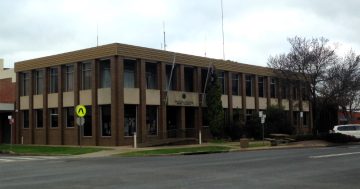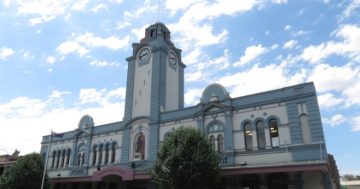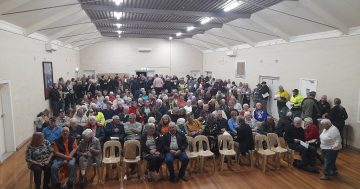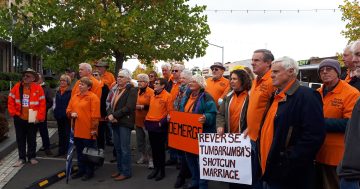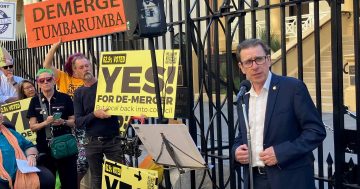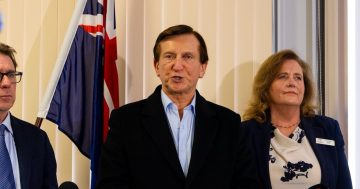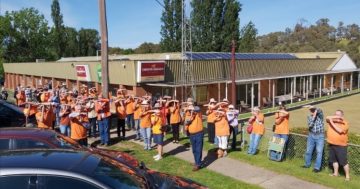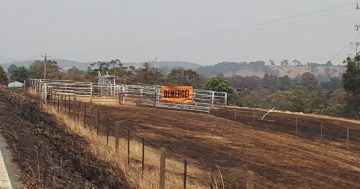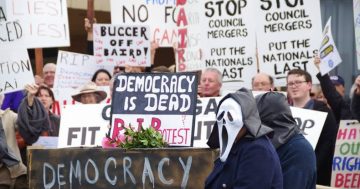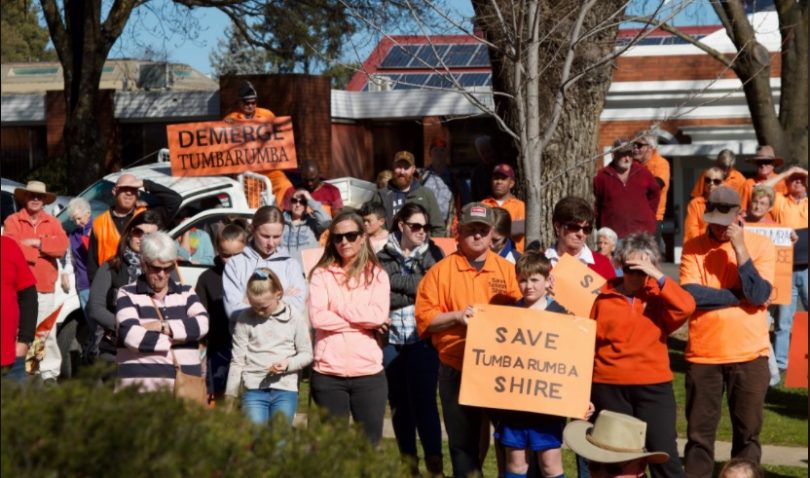
Efforts to see the former Tumut and Tumbarumba shires restored have given rise to community discontent in parts of the Snowy Valleys local government area. Photo: Save Tumbarumba Shire.
Pre-polling in the 2024 NSW local government elections began on Saturday (7 September), but Snowy Valleys voters remain in a state of flux while their future remains in the hands of the NSW Government.
Residents, particularly of Tumbarumba, have been agitating for a reversal of fortune since 2016 when the then-state government forcibly merged the former shires of Tumut and Tumbarumba, leading to community disharmony across the western foothills of the Snowy Mountains.
Pundits say locals feel like they’re living in no man’s land right now, not knowing if the council they vote for in this election will be the council that sees them through the next four-year term or whether they’ll be beating a track to another election, should their efforts to demerge finally succeed.
The LGA, with 10,472 electors across 8961 square kilometres, is served by nine councillors.
The first elector-led effort to demerge can be traced back to 2019 and resulted in the then-Local Government Minister Shelley Hancock knocking them two years later due to a lack of consensus, instead ordering an independent statutory review examining the membership composition, functions and processes of the NSW Local Government Boundaries Commission (LGBC).
But in September 2023, it was Snowy Valleys Council that resolved to present a business case in a second attempt to demerge.
This was greenlit by Labor’s Local Government Minister Ron Hoenig and led to LGBC-run public hearings in Tumut and Tumbarumba in May this year.
Submissions for the demerger were being taken as late as June 2024, thanks to an extended deadline, but it’s been anything but quiet in Snowy Valleys as the council, in the face of rising costs and rejection of a 35 per cent special rate variation, has cut vital services, which included town and village libraries.
One group and 11 individual candidates – seven of whom have already served on the council in previous terms – have put up their hands for the 2024 local government elections.
About Regional asked each contactable candidate their top priorities if elected. They are listed below in ballot paper order.
The three-candidate Group A is led by Michael Inglis of Little River, near Tumut, and includes Barney Hyams and Max Gordon-Hall, both of Batlow, who say they are bringing a powerhouse of skills, dedication, transparency and accountability to restore trust in the Snowy Valleys shire.
Turning to the individual candidates, retired CEO Hugh Packard of Bombowlee, near Tumut, has prioritised ensuring Snowy Valleys Council remains viable, effective and efficient and remains as responsive as possible to current and emerging community needs.
He also shares a determination to strategically plan, with the community, for the medium and long term to ensure council services support and encourage a sustainable future.
Tumut’s Andrew Wortes describes himself as a singing broom maker whose aim for the council is to balance the budget and get the financials in order. He says he will represent all of the Snowy Valleys by making decisions that benefit everybody, supporting local cultural and community events at the same time.
From the western side of the LGA, Oberne Creek teacher and educational consultant Julia Ham is seeking re-election with her listed priorities of financial sustainability, resolution around the demerger, an updated local environmental plan, community advocacy around proposed renewable energy projects and support for local infrastructure projects.
Another Little River resident, business owner David Sheldon, lists among his priorities the restoration of the community’s confidence in the council, an open-book policy and, from a financial perspective, restoration of the council’s quadruple bottom line while sourcing alternative income streams and ensuring operational plans are designed to achieve the goals and objectives of the strategic plan.
Former mayor, teacher James Hayes of Adelong, is also seeking re-election to Snowy Valleys Council on a platform of transparent, cohesive, collaborative and consultative communication. He believes forced amalgamation and cost-shifting impacts on the council’s finances should be emphasised to the State Government but is future-focused. He says the communities have much to gain, in terms of amenities, facilities and opportunities, by working together. Attracting and retaining quality staff remains one of his highest priorities.
Incumbent councillor, Batlow businessman Sam Hughes, says the merger and the state of the council’s financial stability are historically connected.
His view is that structural deficit is a challenge to all regional councils, and turning it around will take changes in all parts of the community and a dynamic team of councillors.
Video producer Grant Hardwick, of Tumut, says he is seeking to be a voice for the community while also striving for transparency within the council.
Also seeking re-election is former Tumut Shire mayor and Snowy Valleys deputy Trina Thomson.
Newly retired after having worked for the Department of Education for more than 46 years, she says the top-three issues facing the incoming council are recruitment and appointment of a general manager, financial sustainability and better community engagement across the LGA from all councillors.
Retailer and woolgrower Johanna (Hansie) Armour, of Bookham, says if she were to be re-elected, her priority would be rebuilding trust – between ratepayers and the council, and between councillors and staff – which was so badly impacted by the forced merger of 2016.
She also seeks to rebuild the council’s financial foundations to arrest the downward spiral and to bring transparency back into day-to-day operations.
No specific information on the priorities of former Snowy Valleys deputy mayor John Larter (Mondongo) or incumbent councillor and local Tumut fire captain Michael Ivill could be found at the time of publishing.
Some of the candidates provide information about their credentials to run as councillors and what their priorities will be on the NSW Electoral Commission website, which also includes details about polling booth locations.







